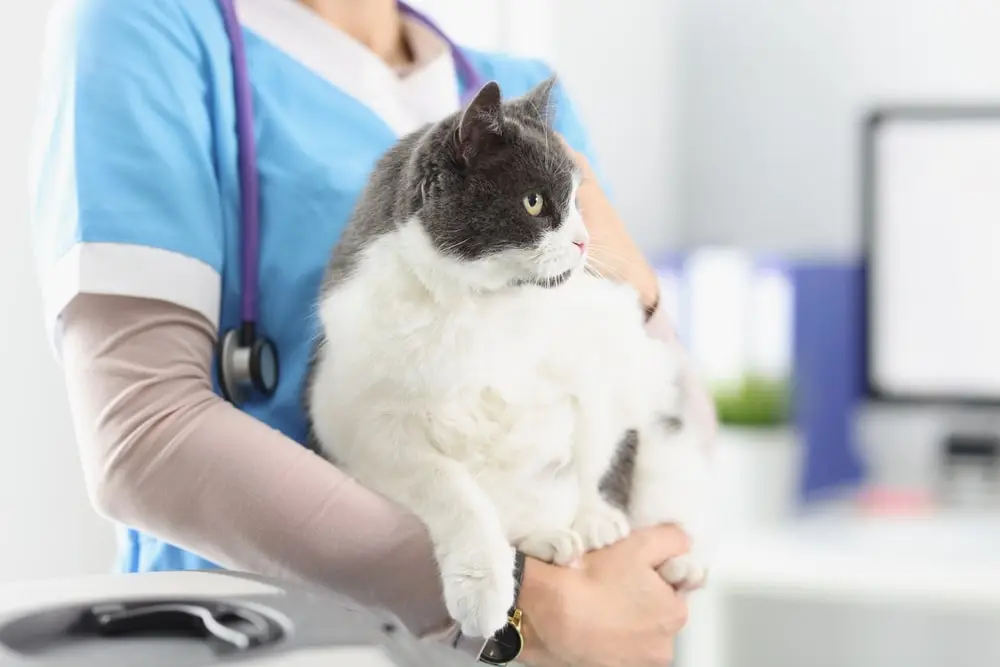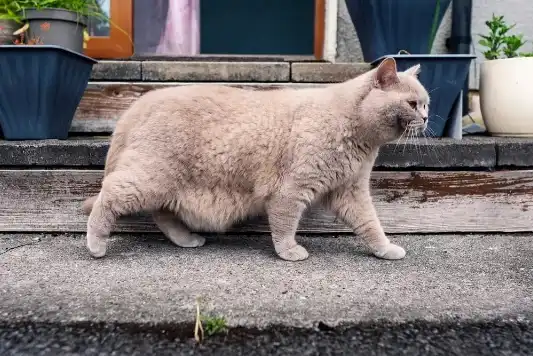PET CARE
Let’s Talk Weight: How Heavy Should My Cat Be?
We love our cats. And sometimes, that means we like to spoil them. However, it can be easy for cats to gain weight if they’re getting too many treats, not enough exercise, or are eating too much food. So if you’ve ever looked at your fluffball and wondered, “How heavy should my cat be?” — we’ve got you covered.
In short, an ideal cat weight can depend on factors like age and breed, but there’s no specific number that applies to every cat.
Weight gain or loss isn’t always food-related either. Both overweight and underweight cats may also be experiencing underlying health conditions that are causing their unhealthy weight. Read on to learn what a healthy cat weight is, how to tell if your cat is underweight or overweight, and how to get them to an ideal weight.
What’s a Healthy Weight for a Cat?
Generally, the average domestic cat should weigh approximately 8 – 10 pounds.1 However, a healthy weight for a cat can vary based on factors like age, sex, breed, activity level, and underlying health conditions.
The average cat weight for a larger breed will likely be more than the average weight for a smaller breed. For example, a Maine coon could weigh up to 18 pounds, whereas a Siamese could weigh only 6 pounds. If you have a mixed breed cat, pinpointing a healthy weight could be harder, especially if the breed mix is a larger cat and a smaller cat combined. Add in the fact that females typically weigh less than males, and you’re starting to see how there isn’t just one number that’s considered a normal cat weight.
To figure out what a healthy weight for your cat is, talk with your veterinarian.
Why Is a Healthy Weight Important?
It’s important for your cat to be at a healthy weight because it can help them feel their best, get around easier, and potentially live longer. In fact, the mortality rate in obese cats is almost three times higher than it is for lean cats.2 And since 50% of cats in America ages 5 – 11 are considered overweight, it’s easy to see why preventing obesity may be in the forefront of pet parents’ minds.2
In terms of obesity, a healthy cat weight helps decrease their risk of developing diseases or making symptoms of certain diseases worse. This can include:2
- Arthritis and other joint problems
- High blood pressure
- Cancer
- Urinary bladder stones
- Type 2 diabetes
- Cardiovascular disease
While not as common as being overweight, cats that are underweight aren’t exempt from problems either. They may have underlying health conditions — like liver failure, hyperthyroidism, pancreatitis, or kidney disease — contributing to their weight issues.3 No matter what side of the weight spectrum your cat is on, making sure they’re at an ideal weight can help keep them healthier into their golden years.
How To Tell if Your Cat Is at a Healthy Weight
Along with a thorough physical examination, vets will likely use a nine-point scoring system to help determine if your cat is at a healthy weight.4 A saggy belly or round midsection can be easy ways to tell if your cat is overweight just by looking at them. In addition to a target weight range, vets usually take into account your cat’s overall health (since there could be underlying health conditions causing weight gain or loss) to see if they’re at an ideal weight.
You can also assess your cat’s physique at home using a scoring system similar to what vets use to determine if your cat is overweight or underweight.2 You’ll need to look at your cat’s side profile and overhead, as well as examine and feel their ribs to compare your cat’s figure to a body condition scoring chart. If your cat resembles a number closer to one, they may be underweight. If your cat resembles a number closer to nine, they’re likely obese.
What To Do if Your Cat Is Overweight
If your cat is overweight, talk to your vet to come up with a weight-reduction program to treat your cat’s obesity. Gradual weight loss is typically what you’ll aim for, so your cat doesn’t develop serious health conditions (like liver disease) if they lose weight too quickly.4 Below are some things you can do to help with cat weight loss.
Limit “free feeding” and treats
Keeping a steady supply of food in your cat’s bowl and allowing them to eat whenever they please can lead to weight gain. Instead, set up a specific meal time and only feed them the amount of food your vet recommends. If you normally give your cat lots of treats, it may be a good idea to cut back.
Change the way you feed them
If your cat eats their food too quickly, getting them a food puzzle or feeding ball can help pace their eating and increase activity at the same time. You can also try moving their bowl around to different areas of your home for each meal. If you have multiple cats, feed them separately to prevent overweight cats from stealing other cats’ food.
Find the right food
You can try feeding your overweight cat wet food instead of dry — it’s higher in protein and lower in carbohydrates, which can help cats lose weight.4 Ask your vet for their recommendation because they may advise placing your cat on a special diet food. If you’re worried about the cost, you may be able to get food that has been prescribed by your vet covered by a MetLife Pet cat insurance policy.5,6
Increase your cat’s activity
Increasing your cat’s activity can help cats losing weight make more progress than through diet alone — just make sure your vet says it’s safe to do. Cats are designed to expend short bursts of energy and then rest for hours.1 This can make increasing activity difficult, but it’s not impossible.
Opt for short sessions of indoor play time with or without toys, short walks on a harness, or supervised outdoor play time. Purchase cat houses and/or trees to help them climb and burn more calories. When your cat starts to look tired, let them rest. You can try another activity later, so they don’t burn out or become disinterested.
What To Do if Your Cat Is Underweight
Whether you just adopted a cat or found a stray that’s malnourished or has feline anorexia, underweight cats need special attention, too. Feline anorexia — aka sustained loss of appetite — may be a sign of underlying health concerns.3 So if your cat is underweight, talk with your vet to come up with a safe way to help them gain weight. Below are some things you can do to help your cat pack on some healthy pounds.
Increase your cat’s food intake
One of the easiest ways to help your cat gain weight is by increasing the amount of food you’re giving them. But not all foods are created equal, and you’ll want to make sure you’re feeding them the right food. Your vet can recommend options to ensure they’re getting the proper nutrition, as special diet foods can also help cats gain weight.
You don’t want to feed your cat too many treats or drastically increase their food intake. Just like treating overweight cats, you don’t want to shock an underweight cat’s system. Aim for gradual weight gain by slowly increasing the amount of food you give them. Your vet will typically give you specific feeding instructions.
Understand picky eaters
Sometimes, cats can be underweight because they’re very particular about food. You’ll have to do some experimenting, but learning what your picky kitty likes can help them eat more regularly and gain weight.
Try feeding your cat different types of food — like wet, kibble, or a mix of both — sampling different flavors, or adding toppers. You can also try hand feeding your cat, using a special bowl they seem to like, or warming the wet food so it’s more enticing.
Manage stress
Some cats may be too scared or stressed to eat — whether it’s from anxiety, recent changes to their life, or their environment. Your vet can help you figure out what’s causing your cat’s stress and come up with a treatment plan to manage it, so they’ll eat more regularly and won't develop feline anorexia.
Stimulate physical activity
If your vet tells you it’s safe, stimulate your cat with physical activity to help them grow muscle and gain weight in a healthy way — not just gain fat. The same activities for overweight cats can help underweight cats build muscle and strength. Just remember to opt for short sessions and let them rest.
Manage Your Cat’s Weight and Your Vet Bills
Whether you have an overweight or underweight cat, vet bills and the cost of special prescription food can add up. A MetLife Pet Insurance policy can help, so you can get your cat the best care, and food, around.6 Get a free quote today and see how enrolling in a policy now can help you save later.
Protect your Cat
Dr. Hunter Finn is an integrative veterinary expert first, and social media star second. America’s favorite veterinarian owns Pet Method in McKinney, Texas, where he cares for pets while prioritizing their emotional well-being. When he’s not at his clinic, he’s starring in viral videos on TikTok (2 million followers) and Instagram (500K followers) — where he’s been known to snuggle puppies and conquer the latest dance trends.



